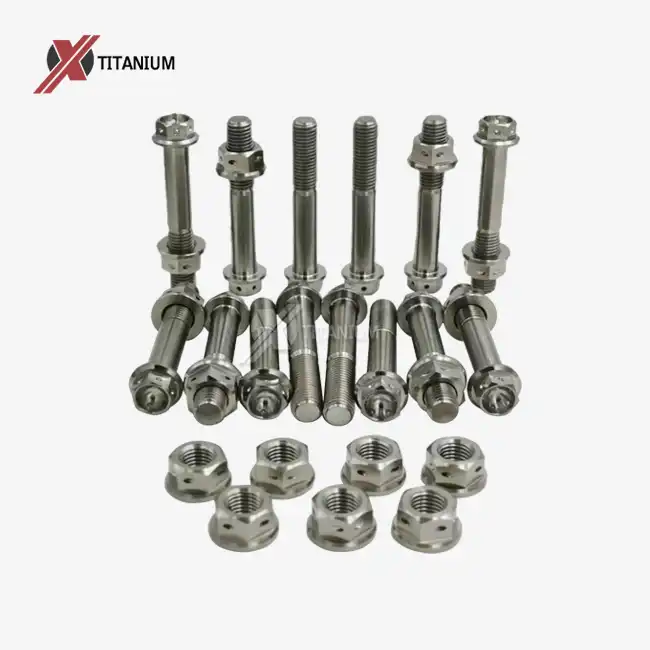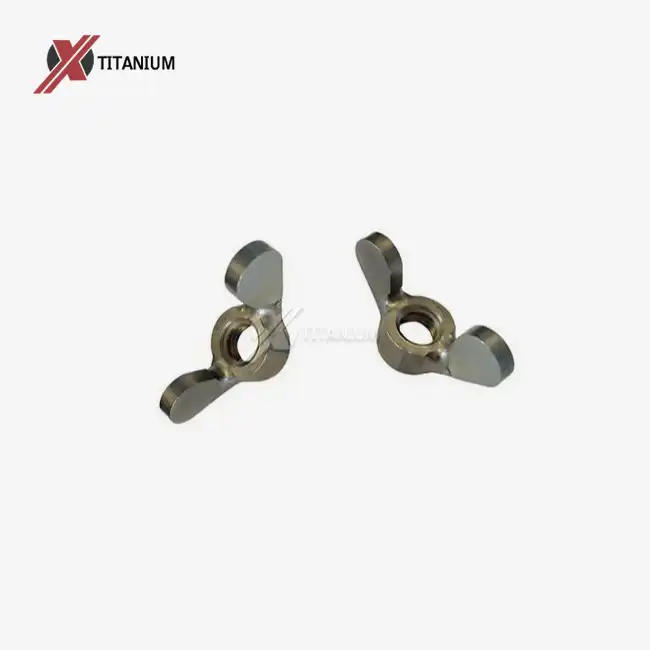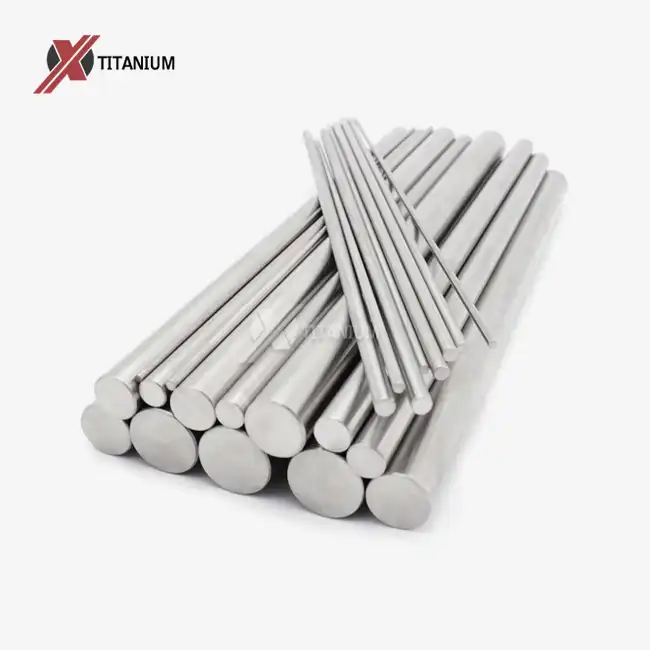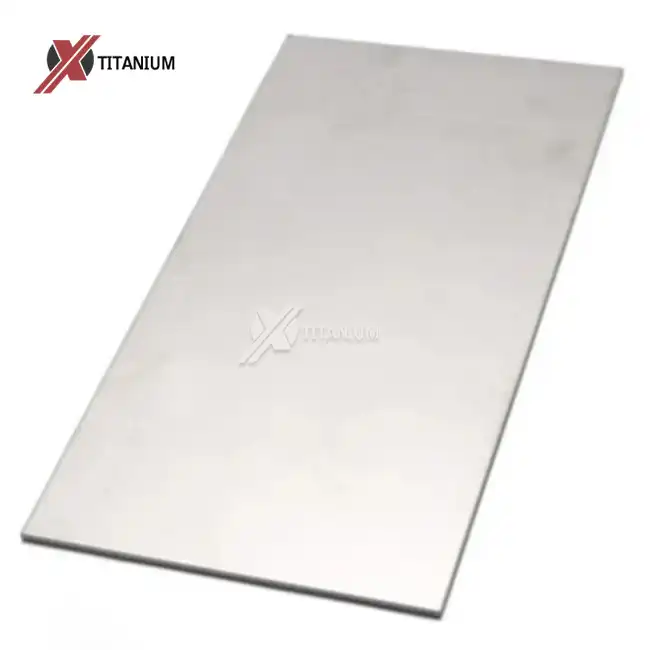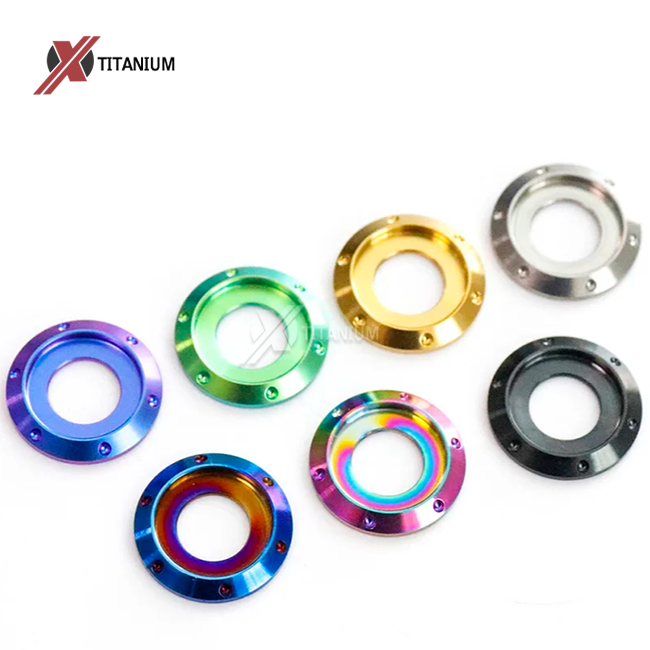The Science Behind Titanium's Lightweight Properties
Atomic Structure and Density
The lightweight nature of titanium bolts stems from the element's atomic structure. Titanium has a lower density compared to steel, which translates to less mass per unit volume. This fundamental property allows titanium bolt kits for motorcycles to maintain strength while significantly reducing weight. The atomic number of titanium is 22, with an atomic weight of 47.87 g/mol, whereas iron, the primary component of steel, has an atomic number of 26 and an atomic weight of 55.85 g/mol. This difference at the atomic level contributes to titanium's lower overall density.
Strength-to-Weight Ratio
One of the most compelling reasons for choosing titanium bolt kits for motorcycles is their exceptional strength-to-weight ratio. Despite being lighter than steel, titanium alloys used in high-performance bolts can match or even exceed the strength of many steel grades. This means that titanium bolts can provide the same structural integrity and load-bearing capacity as steel bolts while weighing significantly less. The strength-to-weight ratio of titanium is approximately 60% higher than that of steel, allowing for the creation of robust yet lightweight fasteners.
Crystalline Structure
The crystalline structure of titanium also plays a role in its lightweight properties. Titanium has a hexagonal close-packed (HCP) crystal structure at room temperature, which differs from the body-centered cubic (BCC) structure of steel. This HCP structure contributes to titanium's lower density while maintaining excellent mechanical properties. The unique crystalline arrangement allows titanium atoms to pack efficiently, resulting in a material that's both strong and light – ideal characteristics for titanium bolt kits for motorcycles.
Benefits of Lightweight Titanium Bolts in Motorcycle Applications
Enhanced Performance
The reduced weight of titanium bolt kits for motorcycles translates directly into improved performance on the road or track. By decreasing the overall mass of the motorcycle, titanium bolts contribute to better acceleration, more responsive handling, and improved braking. The weight savings, particularly when applied to rotating or reciprocating parts, can have a noticeable impact on the bike's dynamics. Riders often report a more agile feel and quicker direction changes when using titanium fasteners throughout their motorcycles.
Increased Fuel Efficiency
While the weight reduction from titanium bolt kits for motorcycles may seem minimal, it can contribute to improved fuel efficiency. Less weight means the engine doesn't have to work as hard to propel the motorcycle, potentially leading to better mileage. This benefit is especially appreciated by long-distance riders and those looking to maximize their bike's range. The cumulative effect of weight savings across various components, including bolts, can result in a measurable difference in fuel consumption over time.
Corrosion Resistance
Past their lightweight properties, titanium jolts offer prevalent erosion resistance compared to steel. This characteristic is especially important for bikes uncovered to cruel situations, such as coastal zones with salt-laden discuss or districts with visit precipitation. The characteristic oxide layer that shapes on titanium's surface gives amazing assurance against erosion, guaranteeing that titanium jolt units for bikes keep up their judgment and appearance over time. This resistance to erosion not as it were jam the stylish offer of the clasp but too avoids issues like seized jolts or auxiliary debilitating due to rust.
Considerations When Upgrading to Titanium Bolt Kits
Cost Analysis
Whereas titanium jolt units for bikes offer various points of interest, it's critical to consider the starting speculation. Titanium latches are for the most part more costly than their steel partners due to the higher fetched of crude materials and more complex fabricating forms. In any case, the long-term benefits, counting progressed execution, solidness, and potential fuel reserve funds, can counterbalanced the introductory cost for numerous riders. When assessing the taken a toll, it's pivotal to consider the whole lifecycle of the jolts, counting their resistance to erosion and potential for reuse over different bicycle builds.
Installation Considerations
Installing titanium bolt kits for motorcycles requires attention to detail and proper technique. Titanium's properties, while beneficial in many ways, also mean that these fasteners can be more susceptible to galling or seizing if not installed correctly. It's essential to use appropriate lubricants and torque specifications designed for titanium fasteners. Many manufacturers provide detailed installation instructions with their titanium bolt kits, and it may be worthwhile to have a professional mechanic perform the installation to ensure optimal performance and longevity.
Compatibility and Safety
When upgrading to titanium bolt kits for motorcycles, it's crucial to ensure compatibility with your specific make and model. While titanium bolts are designed to replace steel fasteners in many applications, there may be certain high-stress areas or specialized components that require specific materials or grades of titanium. Always consult with the manufacturer or a qualified motorcycle technician to verify that the titanium bolts you're considering are appropriate for your intended use. Safety should never be compromised in the pursuit of weight reduction or performance gains.
Conclusion
Titanium bolt kits for motorcycles offer a significant weight reduction compared to steel, with savings of up to 45%. This lightweight property, combined with titanium's strength, corrosion resistance, and durability, makes it an excellent choice for riders looking to optimize their motorcycles' performance. While the initial cost may be higher, the long-term benefits often justify the investment for enthusiasts and racers alike. As with any motorcycle modification, it's essential to consider all aspects, including compatibility, proper installation, and safety implications.
By carefully weighing these factors, riders can make an informed decision about upgrading to titanium fasteners and potentially enhance their riding experience. For more information about titanium bolt kits for motorcycles and other titanium products, please contact Baoji Chuanglian New Metal Material Co., Ltd. at info@cltifastener.com or djy6580@aliyun.com. Our team of experts is ready to assist you in finding the perfect titanium solutions for your motorcycle needs.
